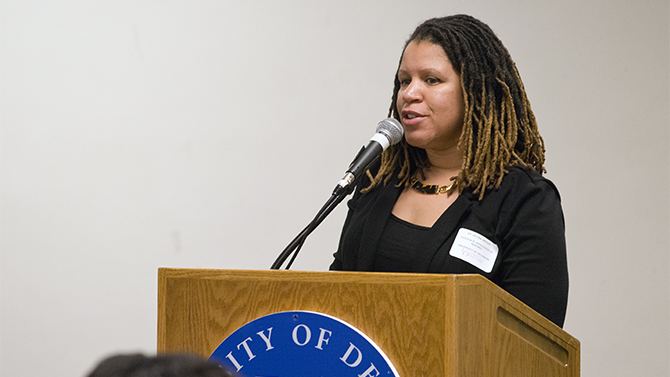


The 'smartness' of diversity
Photo by Lane McLaughlin November 15, 2016
UD ADVANCE faculty fellows offer trainings for search committees
When the University of Delaware’s Regina Wright led a recruitment workshop for her faculty colleagues in the College of Health Sciences this summer, she stressed the added benefits of considering diversity, both intellectual and social, when searching for new professors.
Intellectual diversity includes aspects such as area of expertise and academic discipline, while social diversity includes facets such as gender, race and physical ability.
Wright, associate professor in the School of Nursing, is one of the UD ADVANCE Institute’s faculty fellows. The ADVANCE fellows provided workshops this semester on best practices in faculty recruitment for search committees in their colleges.
In addition to Wright, the UD ADVANCE faculty fellows include: Michael Chajes, professor, civil and environmental engineering; David Kirchman, Maxwell P. and Mildred H. Harrington Professor, School of Marine Science and Policy; J-P Laurenceau, Unidel Gilchrist Sparks Chaired Professor, psychological and brain sciences; Karen Rosenberg, professor, anthropology; and Carol Wong, associate professor, School of Education.
The faculty recruitment workshops were based on earlier versions adapted by the UD ADVANCE group from work conducted at the University of Michigan and the University of Wisconsin at Madison under National Science Foundation ADVANCE grants. The workshops both provide evidence for the value of a diverse faculty and include best practices recruiting an excellent and diverse faculty.
During her presentation, Wright referenced a 2014 article by Katherine W. Phillips in Scientific American titled “How Diversity Makes Us Smarter.”
“Diversity can give us a competitive advantage,” Wright summarized. She explained that when we expect to interact with a group that we know is diverse, “we may come to a situation more prepared. We may come expecting debate. And we know in academia intellectual debate is a great thing. That’s where great ideas come from.”
However even if a search committee agrees that hiring diverse faculty is beneficial for the college, this will not necessarily lead to a greater number of diverse candidates in the finalist pool.
According to Laurenceau, “We have learned from the social and behavioral science literature that knowing someone’s gender, race, or age can automatically activate biases that can contribute to discrimination in faculty hiring, often in unintended ways. Moreover, natural group-based social processes (e.g., self-silencing in the presence of high status colleagues) can derail equitable decision-making. By virtue of being human, each of us can fall prey to this and just being aware of our automatic biases or tendencies may not be enough to reduce their influence.”
In other words, people often make assumptions about race and gender – even their own. People are more apt to apply these implicit assumptions when they are under stress or under time pressure – two criteria that are very present when serving on a faculty search committee.
ADVANCE recruitment workshops present evidence-based practices for search committees, highlighting how deliberate choices in designing all stages the faculty hiring process may help reduce the influence of biases and group-based social processes.
For example, ADVANCE recommends that committee members should work to ensure a large and diverse pool of candidates through a number of actions, including: calling potential candidates and inviting them to apply for open positions; developing and using an evaluation rubric and bringing numerical ratings and opinions in writing to meetings; and striving to include more than one woman or candidate from an underrepresented group in the final pool.
A sample list of recruiting best practices is available as a bookmark and can be found here.
The discussion-intensive workshops also provide faculty the opportunity to learn from each other. Kirchman pointed out that different units have different methods of conducting faculty searches. It is helpful to hear about and discuss effective practices from colleagues in different departments.
According to Wright, these type of workshops, which include modules on implicit bias, have been shown both nationally and locally to make a difference in the hiring of an excellent and diverse faculty.
For more information on the UD ADVANCE Institute, the faculty fellows program, or to request faculty recruitment bookmarks, contact the UD ADVANCE Office.
About UD ADVANCE
Supported by the National Science Foundation (Grant No. HRD-1409472), the UD ADVANCE Institute focuses on diversifying and strengthening the University’s faculty. Specifically, the Institute seeks to develop new ways to increase the representation and advancement of women faculty, particularly women of color.
Contact Us
Have a UDaily story idea?
Contact us at ocm@udel.edu
Members of the press
Contact us at 302-831-NEWS or visit the Media Relations website

